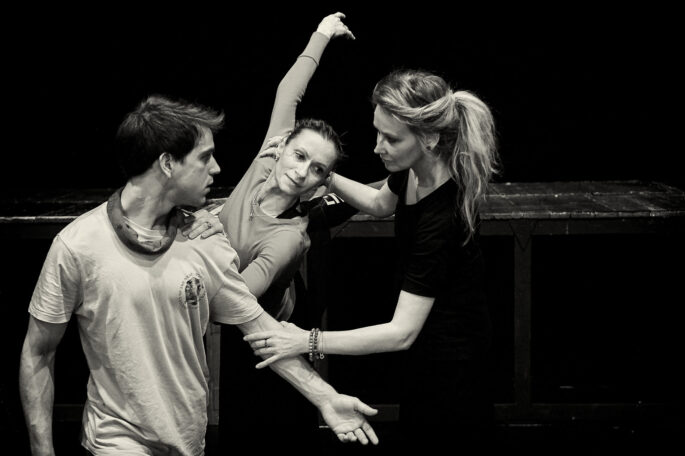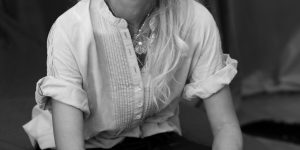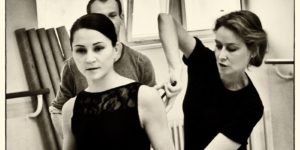Author., 23.03.2019 0:05, Opera Plus
On 29 March and 7 April 2019, the Šaldov Theatre in Liberec will host the premiere of the production of the ballet The Tempest, directed and choreographed by Alena Pešková, who is also the author of the libretto based on the drama of the same name by Alexander Nikolayevich Ostrovsky. Jakub Kabeš talked to this Czech choreographer, ballet dancer and director not only about The Tempest, but also about the smallest "stone" ballet company in the Czech Republic and about the traditional and non-traditional in contemporary dance.
What was the impetus for your choice of Ostrovsky's The Tempest?
I don't know myself. There are themes that one carries within oneself, and it is useless to ask why. It sounds almost ridiculous, but can you believe that it wasn't until I finished writing the libretto that I realised it was all Gazda's work on the Volga? And I also staged Gazdina, please, for the Liberec Ballet just a few years ago! Suicide for love, a dark river, the individual versus society. But in my defence, I must point out that I have also done comedy.
It is a well-known fact that ballet is the most difficult of all the performing arts. Do you think The Tempest is difficult for dancers in terms of choreography?
I don't know if it's common knowledge. I'm not even sure if it is? Ballet tends to be the art that's most demanding of time and space. Music is time for us, art is space. What connects space and time is movement, and that's us! The technical or physical readiness to transcend these variables must be a given in order to express everything we need to. On the other hand, I am not at all interested in the viewer admiring the technical difficulty of the work in the first place. I think that in the case of The Tempest, the partnering is a bit more challenging for the soloists, and not just in terms of choreography. There are little nuances that have to be respected and adhered to in order to be true to the content. All it takes is a different tilt of the head and you're expressing something completely different. But everything grows from within. If you know what you want to say, the head will find its own inclination.
Is the whole troupe dancing? Can the audience look forward to seeing their dance idols?
Yes, the whole ensemble is dancing again! We are the smallest "stone" ensemble in the Czech Republic. There are 13 dancers in all. I'll borrow freelancers, hand out roles, and find I have one couple left for the townspeople. The dramaturgy, the direction, and the whole concept must always be subordinated to this fact. I'm not complaining, it's a challenge. But seriously: for the main role of Katya I "borrowed" my former colleague - currently a soloist at the National Theatre in Brno, Ivona Jeličová. I last worked with her on the dance drama Marysha. It was my first independent full-length ballet and Ivona received a Thalia for Marysha. She is great to work with, she is very empathetic, she can immediately judge a situation and how I want to process it. She has matured incredibly as an actor. She's a "tragedian" in the best sense of the word. I am very much looking forward to her introduction to the Liberec audience. And the other roles are again tailored to the "idols" of our ensemble. Boris is danced by Rory Ferguson, but the soloists are all here.
Can the audience expect something unconventional in Storm?
Well. I don't know. It's very unconventional to stage anything traditionally these days. In the case of contemporary dance and ballet, the situation is even more complicated. Either we're heavily demodé or we're so far ahead that nobody understands us. I try not to dwell on it. For me, a little is enough. For example, when tragedy strikes. And when it's all conveyed in a refined manner. So, perhaps traditional Orthodox sacred chants will be incorporated into contemporary music in an unconventional way. The author of the music is Mr. Michal Vejskal. This is my first time working with him and I must say that I find his music very inspiring. From the beginning we agreed to go completely outside of Janáček's Katya Kabanova. And so we're going. The stage and costumes are prepared by Mr. Aleš Valášek. We also agreed with him first of all that this production will not orthodoxly cling to the time and space that was intended for Ostrovsky. For example, in the costumes there may be a noticeable Art Nouveau inspiration, but we can go as far as the uniformity of the 1950s' uniforms. Rather, what is important here is to give each character a character. Also, there may be some rain ...surprisingly :) - if the dancers can handle it.




Comments are closed.